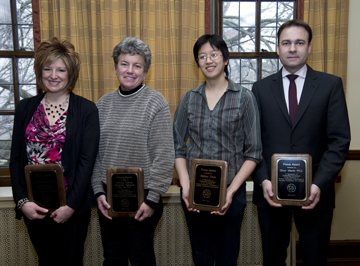March 8, 2013
Four honored with Focus Awards for efforts related to disabilities
 |
|
The 2013 Focus Award recipients and award
category are (from left) Carrie Anderson, staff; Sally Irvin,
organization/alumna; Mallory "Mel" Chua, student; and Oliver Wendt,
faculty. The awards were presented March 5 in Purdue Memorial Union's West
Faculty Lounge. (Purdue University photo/Mark Simons)
|
Four initiators of diverse win-win approaches to furthering Purdue's commitment to disability accessibility and disability diversity received Purdue's annual Focus Awards on Tuesday (March 5) at a reception kicking off Disability Awareness Month. This year’s theme highlighted "Diversity Within the Disability Community."
The 13th annual awards reception, held in Purdue Memorial Union, was presented by the Office of Institutional Equity. Alysa Christmas Rollock, vice president for ethics and compliance, presented the awards, saying, "This is one of the best days of the year for me every year" because it celebrates hard work, innovation and real-world service. It was also noted that the speaker at the 2012 reception had sparked a student-initiated tutoring project.
The keynote speaker was retired Marine Staff Sgt. Eric Alva, who was the first member of the U.S. military injured in Iraq in 2003. Alva described the circumstances of the injuries he sustained after stepping on a land mine, the resulting disabilities and his unique experiences overcoming obstacles. He also highlighted that people with disabilities are a diverse group of people, referring to himself as Latino, gay, disabled, and a veteran.
In 2007 he advocated a bill designed to repeal the military's "don’t ask, don’t tell" policy, and in September 2011 he stood behind President Barack Obama as the president signed the law repealing the policy. Alva said his own message is to be thankful and accept who you are and what you have, don't sweat the small stuff, and be grateful for every day.
The Focus Awards for 2013 were given to the following:
* Faculty: Oliver Wendt (pronounced "vendt"), assistant professor in the Department of Educational Studies and the Department of Speech, Language, and Hearing Sciences. Wendt led a collaboration across several Purdue disciplines to create a computer-based communication tool for children with severe autism. The project, which involved major contributions by students, produced SPEAKall!, an app used on an iPad that is more portable and less costly than previous devices. The app is a hit, proving easy to program, intuitive to operate, and able to stimulate significant progress in autistic children.
* Staff: Carrie Anderson, supervisor at Wiley Dining Court. Anderson has become a noted advocate for students with food allergies. If severe enough, allergic reactions are disabling -- as Anderson learned when her oldest son was a baby and had several food allergies. Her experiences led her to acquire knowledge and a passion for helping students with food allergies have a great educational experience at Purdue. She has made herself available to parents of such students, she consults on summer camps and conferences at Purdue, she has trained employees in other campus dining courts, and speaks at conferences for university food service associations.
* Student: Mallory "Mel" Chua, first-year doctoral student in engineering education. As a computer engineer, Chua has revised and is teaching -- by invitation of the Department of Speech, Language, and Hearing Sciences -- a graduate class on signal processing to second-year audiology clinical doctoral students. Now, in a collaboration with the multidisciplinary engineering capstone course, she is designing solutions to make Purdue’s studio-style classrooms more accessible to people with hearing loss. She also has an interest in increasing access to STEM disciplines to children with hearing loss.
* Organization/alumna: Indiana Canine Assistant Network (ICAN), founded by Purdue alumna Sally Irvin in 2001. ICAN trains and place service assistance dogs with persons with disabilities. Besides the unconditional love the dogs provide, they can provide services such as retrieving dropped or unreachable items, opening and closing doors and cabinets, and even turning light switches on and off. The dogs are trained by inmates in the state's correctional facilities, helping them find purpose and develop skills. And the dogs, in addition to providing both practical and psychological benefits, enjoy being useful and loved. ICAN is one of only two programs in the nation in which the clients go into the prison setting to receive orientation to the dog from the inmate trainer.